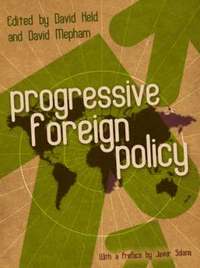
endast ny
Progressive Foreign Policy Upplaga 1
In May 1997, the then UK Foreign Secretary, Robin Cook, famously said that foreign policy should have ‘an ethical dimension’, and that the Labour Government would ‘put human rights at the heart of foreign policy’. Although not described in these terms, these assertions were an attempt to articulate a ‘progressive’ conception of foreign policy for the UK. But how does the foreign policy record of the Labour Government stand when set against these declared principles? What role have ethics really played in Labour’s foreign policy? Why has Labour been so interventionist, from Kosovo to Iraq? What does this record tell us about the limits and the possibilities of progressive foreign policy? What does it tell us about the strengths and failures of Labour’s foreign policy?
This timely book, published in association with the Institute for Public Policy Research and the Centre for Global Governance at the LSE, addresses these questions and provides an appraisal of Labour’s record in power. However, the book also looks forward. It provides a novel assessment of the international trends that will shape the global context of UK foreign policy. The contributors set out new perspectives and policy options in respect of international security, democracy, justice, human rights, and sustainability. In addition, the book offers fresh thinking on the UK’s relationship with key countries and regions, from the US to Europe, from the Middle East to China. Moreover, it suggests a radical new approach to global governance and to the way in which the UK makes and implements foreign policy.
At a time of real flux in UK domestic politics and of rapid change in international politics, this book is an indispensable guide to the UK’s foreign policy options and to the prospects and possibilities of a more values-driven and effective UK foreign policy.
Upplaga: 1a upplagan
Utgiven: 2007
ISBN: 9780745641157
Förlag: John Wiley & Sons
Format: Häftad
Språk: Engelska
Sidor: 272 st
In May 1997, the then UK Foreign Secretary, Robin Cook, famously said that foreign policy should have ‘an ethical dimension’, and that the Labour Government would ‘put human rights at the heart of foreign policy’. Although not described in these terms, these assertions were an attempt to articulate a ‘progressive’ conception of foreign policy for the UK. But how does the foreign policy record of the Labour Government stand when set against these declared principles? What role have ethics really played in Labour’s foreign policy? Why has Labour been so interventionist, from Kosovo to Iraq? What does this record tell us about the limits and the possibilities of progressive foreign policy? What does it tell us about the strengths and failures of Labour’s foreign policy?
This timely book, published in association with the Institute for Public Policy Research and the Centre for Global Governance at the LSE, addresses these questions and provides an appraisal of Labour’s record in power. However, the book also looks forward. It provides a novel assessment of the international trends that will shape the global context of UK foreign policy. The contributors set out new perspectives and policy options in respect of international security, democracy, justice, human rights, and sustainability. In addition, the book offers fresh thinking on the UK’s relationship with key countries and regions, from the US to Europe, from the Middle East to China. Moreover, it suggests a radical new approach to global governance and to the way in which the UK makes and implements foreign policy.
At a time of real flux in UK domestic politics and of rapid change in international politics, this book is an indispensable guide to the UK’s foreign policy options and to the prospects and possibilities of a more values-driven and effective UK foreign policy.
Ny bok
258 kr271 kr
5% studentrabatt med Studentapan
Begagnad bok (0 st)
Varje vecka tillkommer tusentals nya säljare. Bevaka boken så får du meddelande när den finns tillgänglig igen.



